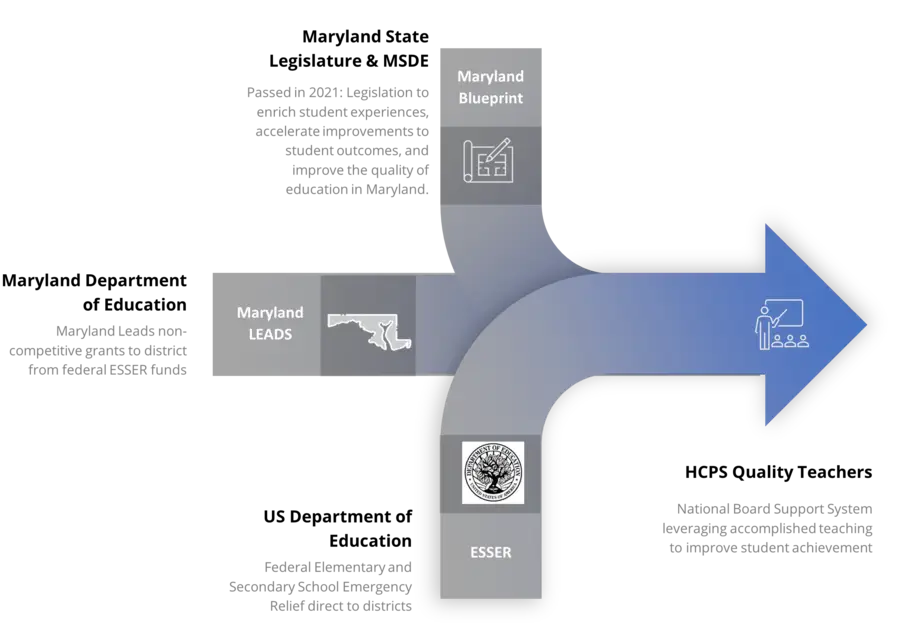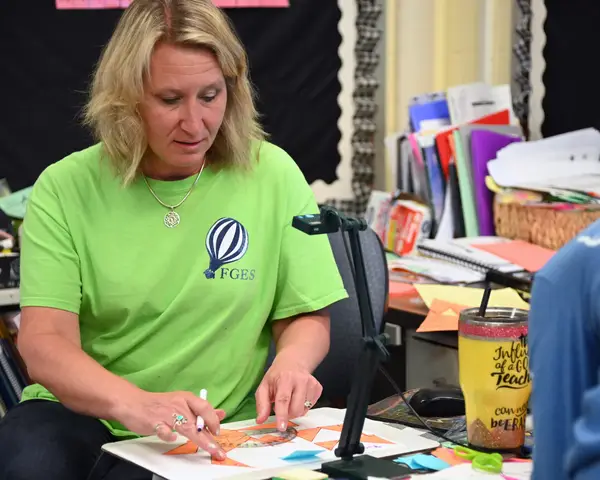
Creating a Blueprint for COVID-19 Recovery and Student Success in Maryland
The COVID-19 pandemic had substantial, lasting impacts on K-12 education. To address the multifaceted challenges involved in the recovery process, the Maryland State Department of Education took a comprehensive approach to using federal Elementary and Secondary School Emergency Relief (ESSER) funds—resources earmarked to help states overcome the educational losses experienced by students and their families during COVID-19. Maryland’s overarching goal is to help students recover or accelerate learning that was lost or deferred during the pandemic. With this in mind, the State asked its 24 local education agencies to align relief efforts to one of seven key strategies:
- Grow Your Own Staff
- Staff Support & Retention
- The Science of Reading
- High-Quality School Day Tutoring
- Reimagining the Use of Time
- Innovative School Models
- Transforming Neighborhoods through Excellent Community Schools
Each district received ESSER funds through non-competitive grants, selected one or more of the Maryland Leads Initiative’s seven high-leverage strategies aligned with their district’s direction, and had the opportunity to partner with consultants to either develop new programs and processes or strengthen existing systems.
Before the beginning of the COVID-19 pandemic, the Maryland State legislature communicated a bold vision in the Blueprint for Maryland’s Future. The blueprint outlined the commitment of the Maryland legislature to advancing the profession of education with an emphasis on teacher quality. This is demonstrated through a recurring investment to reward and recognize National Board Certified Teachers (NBCTs) with substantial salary increases for those earning certification, and additional compensation for educators willing to leverage their accomplished teaching skill in low-performing schools.
Improving Harford County Public Schools’ National Board Support System
Like the rest of the country’s public schools, Harford County Public Schools (HCPS) is confronted with the real challenges that the pandemic brought to K–12 classrooms and schools—including delayed learning and increasing community mental health challenges—which also manifest in the students, staff, and families HCPS serves. This has added a layer of complexity to the work of teaching students. Couple those impacts with the nationwide reduction in teacher candidates and new statewide requirements from the Maryland Blueprint, and there is the very real potential for school systems to be overwhelmed.
HCPS has been very intentional about looking for opportunities to align the increased requirements of federal and state initiatives and investments. In their Maryland Leads grant application, they chose to elevate and publicize areas where they have significant strengths and use those strengths to enhance areas where the district can improve. These strategic investments are exemplified in one of the projects on which HCPS is partnering with RTI’s Center for Education Services.
HCPS Expands National Board Support System
This project was written to expand and improve the district’s National Board support system. HCPS has a long history of supporting candidates to earn their National Board Certification. Not only will earning this credential increase educators’ pay, but it will also, very strategically, increase educators’ positive impact on students—a result that has been well documented (NBPTS, 2023). This investment began with teachers, and the project has been staffed and developed by its NBCTs, a long-standing grassroots effort. By investing in existing work, the district is advancing teacher leadership, creating structures, and enhancing support to help all teachers pursue and earn National Board Certification and the compensation that follows.

When the Maryland Blueprint added additional compensation for teachers earning National Board Certification, Harford’s quality retention and development strategy was elevated. For years, Harford County has supported 20 or more National Board candidates each year, led by three teacher leaders and supported by the HCPS Office of Organizational Development. In the 2022–23 school year, that number was nearly 10 times larger, with almost 200 candidates receiving support. This surge in candidates coincided with the district’s award of its Maryland Leads grant programs, and the RTI team began partnering with the district in December.

We began by developing a deep understanding of the district’s existing National Board support processes. Following an initial observation period of district processes, we partnered with the district’s leadership to facilitate a district meeting with approximately 50 previous support participants, the lead facilitators of the support system in the district, and district staff engaged in employee retention and engagement. This initial meeting helped the project team (1) establish a common understanding of what was already working so those processes could be enhanced, and (2) solicit feedback about opportunities for improvement from the educators who had experienced the district’s support. Both actions helped to orient the work and used past candidate experiences as a sound foundation upon which to build the improved support system.
Following the district meeting, we worked closely with HCPS to codesign a greatly enhanced system of support for National Board candidates. This process communicates the value that RTI places in the existing processes of the district, enables the district to inform pace and differentiation of improvement, and provides opportunities for the district to engage in organizational learning about their impact on teacher development and retention. This iterative approach—coupled with the strengths in the district, from teacher leadership to district leadership—is already being leveraged to enhance this process and provide benefits across the district in many ways.
District Improves National Board Support with Automation and Virtual Options
After 3 months of work, the district’s lead facilitators have had additional support for the in-person sessions; the district’s registration process for the 2023–24 cohort of candidates has been fully automated; and all support materials are being centralized into the district’s learning management system to both expand the support content and allow candidates to access coursework virtually. Facilitating flexible engagement with the material is one way that the district is improving the system to increase participation. Additionally, providing asynchronous support will help the district assess and communicate benefits and challenges of multiple delivery methods as they continue to develop their system.
Aligning Professional Learning with NBPTS Framework for Improved Student Outcomes
As the RTI team helps to create a common framework for the modules of professional learning delivered to candidates monthly through the support, the team has recognized another opportunity: connecting that framework to the National Board for Professional Teaching Standards (NBPTS) instructional framework. The NBPTS is often cited as one of the most impactful opportunities for professional development for teachers. It is grounded in a cycle of continuous improvement of classroom instruction and informed by the practice of teaching and analysis of student work and collaboration in professional learning communities. These are research-endorsed practices that are directly correlated with improved student learning and outcomes. Harford’s lead facilitators have committed to supporting their peers in this process because they know the benefits for them and their own students.
As we began to consider how the modules for support sessions could be redesigned, we proposed the opportunity to align the delivery of those modules to the Architecture of Accomplished Teaching and to make intentional connections to the 5 Core Propositions. This was an enhancement that resonated with Harford’s teacher leaders not only as a way of supporting candidate success, but also—more importantly—as a source of professional learning and development that enabled candidates to experience the intention of the tenets of NBPTS as they consider their own teaching and learning processes. Taken a step further, as district engagement continues, there are opportunities to connect to district instructional frameworks, as well as expectations to realize district goals along with the goals of Maryland Leads grants and the Maryland Blueprint. This could facilitate efficiency that is desperately needed with the many initiatives and requirements for districts, leaders, and teachers. If done well, this project can help teachers and leaders recover critical time to their professional practice while also improving that practice collectively.

Annual and Monthly Improvement Cycles
The continuous improvement cycle is a key aspect of this project. It involves two comprehensive cycles (corresponding with the school year support system), as well as smaller cycles to evaluate and improve the monthly in-person and virtual support sessions the district provides to its candidates. By the time the project comes to a close, the district teachers will have benefited from three iterations of development with a final product that enables them to continually improve and adjust based on state and district context. This approach will leave the district with a system that they can sustain and improve each year to respond to new district, state, and federal requirements.
Supporting Representative Participation through National Board Support
Harford County’s project with RTI has just begun. The district is looking to gain vital leverage from this project. An important component of the 2023–24 partnership is to not only improve the system but to invest in recruitment and participation efforts so the support system can have more of an impact on teachers and, as a result, on the students they teach.
Harford has worked to improve representation in district leadership over the last several years. To this end, they are applying a critical lens to multiple systems in their district. The Harford team is realizing that the National Board support system is an important asset: if leveraged and aligned with district goals, it can be a significant recruitment tool, offering quality professional development through monthly sessions, as well as increased educator compensation after successful certification. However, as we design this system, we are cognizant that these teachers must be at the table to inform continued development and implementation of module materials, processes, and practices. That is part of our continuing work over the next 18 months.
The long-standing grassroots efforts of the district’s NBCTs have been recognized, and because of the investment to study, partner, and codesign improvements by the district and RTI, the best is yet to come. Harford County is not unlike any other district in the nation where strong teacher practice and professional learning communities are helping to benefit isolated groups of committed practitioners. Our aspirations for this project are to create the connections among key processes and key groups of educators to realize a brighter future for teacher practice in Harford County that directly benefits the students they serve.
Learn more about ESSER requirements and RTI's tools that support district investment of these funds.
For Information on the National Board for Professional Teaching Standards:
- NBPTS
- Accomplished Teacher (resources and information aligned to NBPTS by and for teachers)
- Benefits to pursuing NBPTS (including research)

